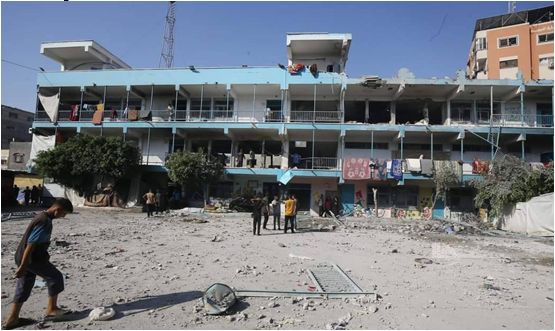Women organizations in Israel sent the Prime Minister of Israel, Benjamin Netanyahu, a demand to allow medicine, medical and sanitary equipment for women and children into the Gaza Strip. “We ask more democratic women’s organizations around the world to send a similar request to the Prime Minister of Israel in support of this basic humanitarian need,” a spokeswoman of the Israeli organizations said.

UNRWA school in Khan Younes sheltering internal displaced people who was been directly hit by an Israeli attack (Photo: WAFA)
The petition said, “We the undersigned, women’s and civil rights organizations and individuals, call upon people of influence around the world to demand that Israel allow the delivery of medicines and women’s health products to Gaza in light of the war and siege of Gaza for the past 11 months. Hundreds of thousands of women and children in refugee camps have been suffering an extreme lack of medications, clean medical equipment and even food and clean drinking water. Pictures and videos from Gaza depict the daily struggle of women and children to survive without the most basic needs as well as the killing of hundreds of health professionals since the beginning of the war almost a year ago.”
“These inhuman circumstances have given rise to acute health dangers such as the spread of Polio threatening the lives of hundreds of thousands of children. Dr. Israa Saleh was quoted on BBC Arabic: ‘There are nearly 700,000 young women in Gaza who are of childbearing age or experienced their first menstrual cycle during this war. These girls and women face tremendous and dangerous challenges because the war has left them without basic hygienic products as well as psychological and emotional trauma.” We call upon you to apply pressure on the government of Israel and demand the delivery of these medicines and health care products to the children and women of Gaza, in accordance with international treaties that Israel continues to ignore. We call upon you to demand that Israel allows the delivery of tons of food and medicines that are stockpiled at the border while Israel allows the delivery of only a few trucks leaving the humanitarian aid that has already been donated to rot in the sun. We are asking for the most basic of rights for the Palestinian women and children under siege in Gaza as a first step to achieving lasting peace in the region.” Among the signatories: Democratic Women Movement in Israel, Mothers, Women Peace Sit In, Haifa Feminist Center and Her Academy.
According to the UN, humanitarian access remains severely hindered, as the denial of missions by the Israeli authorities within Gaza almost doubled in August, compared with July (105 vs. 53). Other factors affecting access include ongoing hostilities, a lack of internal security (including looting) and attacks on aid convoys, the presence of unexploded ordnance, the destruction of key connecting roads, and conditions at Israeli checkpoints. In southern Gaza, despite an overall increase in planned humanitarian movements submitted for the Israeli authorities to facilitate, from 543 in July to 603 in August, the number of facilitated missions in southern Gaza dropped by 28 per cent, from 250 in July to 179 in August. In northern Gaza, the number of facilitated aid missions increased by 10 per cent, from 67 to 74. However, the number of missions denied access rose by 140 per cent, from 30 to 72. These trends have severely disrupted the delivery of life-saving assistance, including water, sanitation, and hygiene services, health care, and fuel urgently needed for the operation of critical health facilities.
In addition, for the second consecutive school year, over 600,000 students in Gaza are being deprived of accessing formal education, as 9 September would have marked the beginning of the new study year. According to the Palestinian Ministry of Education, over 10,000 school students have been killed, and 90 per cent of school buildings have been damaged since October 2023.
Furthermore, according to an assessment conducted by UNICEF and Save the Children, 53 per cent of schools sheltering internal displaced people have been directly hit. Recent examples include incidents on 6 and 7 September, when 12 Palestinians were reportedly killed when a tent housing internally displaced persons in Halima Al Sadia School in Jabalya Camp and a prayer hall inside Amr Ibn Al A’as school in Gaza city, were hit. According to UNRWA, no official schooling is available in any of their 200 schools, but recreational activities and psychosocial support are provided in some of them.


